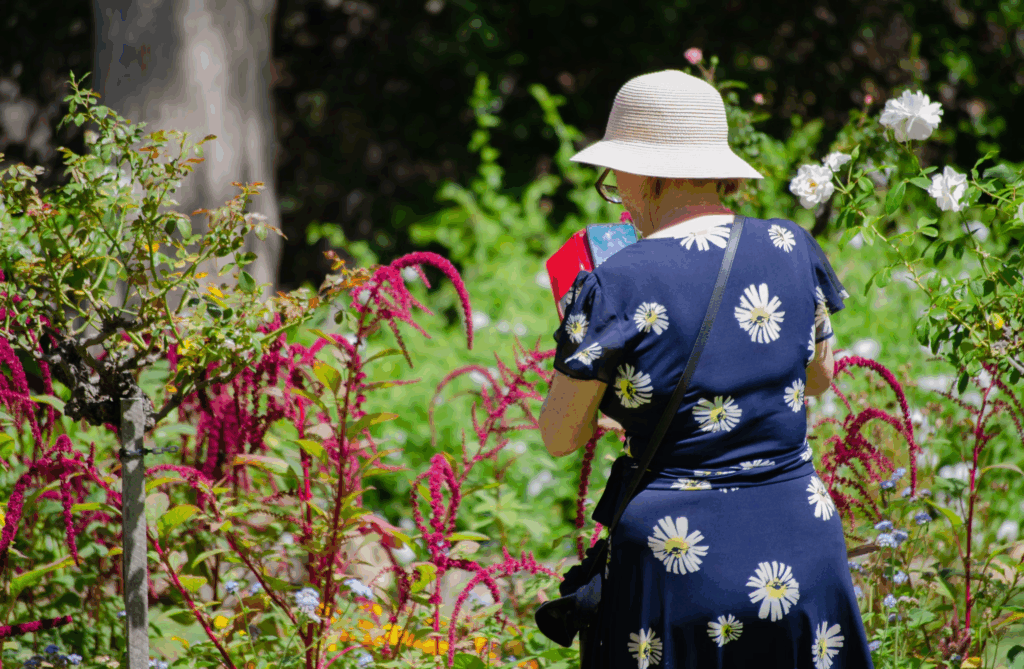
As seniors age, maintaining physical health, mental clarity, and emotional well-being becomes increasingly essential. One often-overlooked yet compelling method for supporting overall wellness is garden therapy and horticultural therapy for seniors in-home care. Whether it’s nurturing a plant, feeling the soil between one’s fingers, or simply enjoying a fragrant bloom, therapeutic gardening offers holistic benefits that are both simple and profound.
What Is Horticultural Therapy?

Horticultural therapy involves the use of plant-based activities to enhance the physical, cognitive, and emotional well-being of individuals, particularly seniors. Unlike casual gardening, horticultural therapy involves intentional engagement with plants—such as planting, pruning, or harvesting—with therapeutic goals in mind. Seniors in-home care can adopt this practice to meet their abilities and preferences, making it highly accessible and practical.
Health Benefits of Gardening for Seniors

- Stress Relief and Emotional Balance
One of the most significant benefits of gardening for seniors is its ability to reduce stress and promote relaxation. The repetitive, rhythmic movements involved in gardening help calm the nervous system, lower cortisol levels, and provide mental clarity. Seniors dealing with anxiety or feelings of isolation often find peace and purpose in garden therapy, especially when it’s integrated into their home care plan.
- Cognitive Stimulation and Memory Support
Gardening activities stimulate the brain through problem-solving, sequencing, and sensory input, promoting cognitive development. For seniors with memory issues or cognitive decline, horticultural therapy can help improve focus, slow the progression of memory loss, and enhance mental agility. Engaging in gardening helps forge new neural connections, which is especially beneficial for seniors with dementia or Alzheimer’s disease.
- Physical Exercise and mobility
Tending a garden naturally incorporates low-impact physical activity. Seniors engage muscles while bending, stretching, lifting, and walking—all of which help maintain balance, flexibility, and strength. Even simple tasks like watering plants or pulling weeds can improve mobility and contribute to better cardiovascular health, making gardening a valuable form of exercise in any senior home care routine.
At Indy In-Home Care, we recognize that meaningful activities play a crucial role in enhancing quality of life. That’s why we encourage incorporating garden therapy into senior home care routines, given its impressive range of health and wellness benefits.
- Boosted Mood and Self-esteem
Watching a plant grow from seed to bloom offers a sense of accomplishment and pride. For seniors, this feeling of success enhances self-esteem and provides a meaningful sense of purpose. Many home care clients report feeling happier and more engaged when they regularly participate in gardening, even in small ways.
- Opportunities for Social Interaction
Gardening can also foster connection. Whether it’s chatting with a caregiver about a thriving tomato plant or sharing harvested herbs with neighbors, garden therapy encourages positive social interactions. For seniors receiving in-home care, these interactions are vital in combating loneliness and promoting a healthier emotional outlook.
Adapting Gardening for Seniors in Home Care

While the benefits of gardening are substantial, it’s essential to ensure the activity is safe and accessible for seniors with limited mobility or cognitive impairments. Here are some practical tips for adapting therapeutic gardening for seniors in-home care:
- Use Raised Garden Beds
Raised beds reduce the need to bend over or kneel, making gardening easier for seniors with joint pain or limited flexibility. Raised planters can be placed on patios or even indoors near sunny windows.
- Provide Comfortable Seating and Shade
For longer gardening sessions, ensure a shady space and ergonomic seating are available. This allows seniors to rest and enjoy the beauty of their surroundings without discomfort or fatigue.
- Choose Non-Toxic and Edible Plants
If your loved one experiences cognitive decline, it’s important to avoid toxic plants. Stick to safe, edible herbs, vegetables, and flowers such as basil, lettuce, lavender, or marigolds.
- Simplify Tools and Tasks
Use lightweight, easy-to-grip tools to reduce hand strain. Avoid sharp implements. Caregivers can assist by prepping soil or setting up watering systems to make tasks more manageable.
- Start with container gardening
For seniors with minimal space or mobility, container gardening is an excellent alternative. Small pots or vertical planters can be placed on balconies, windowsills, or patios, making gardening possible even in small spaces.
Indoor Gardening for All Seasons

Don’t have outdoor space? No problem. Indoor gardening offers many of the same benefits. Potted herbs, flowering houseplants, or small vegetable containers can be maintained with minimal mess and effort. Seniors living in apartments or those with mobility challenges can still engage in therapeutic gardening at home with the help of professional caregivers.
The Role of Caregivers in Garden Therapy

Caregivers play a vital role in helping seniors experience the benefits of gardening. At Indy In-Home Care, our trained caregivers provide support to clients in the following ways:
- Assisting with safe planting and watering
- Monitoring physical activity levels
- Guiding conversations about the plants to encourage cognitive engagement
- We are creating safe and comfortable garden setups that are tailored to meet each client’s individual needs.
Through patient encouragement and thoughtful planning, garden therapy can become an enriching part of any senior home care plan.
Cultivating a Better Quality of Life

Incorporating horticultural therapy into daily routines isn’t just about growing flowers or vegetables—it’s about cultivating joy, health, and connection. Whether indoors or outdoors, container-based or backyard-centered, gardening offers seniors in-home care a gentle, healing activity that nourishes both body and spirit.
At Indy In-Home Care, we’re committed to holistic approaches that enhance the lives of our clients. From engaging activities like garden therapy to personalized in-home support, we believe every senior deserves a life of dignity, purpose, and well-being.
Ready to help your loved one blossom?
Contact Indy In-Home Care today to learn more about how we incorporate wellness activities, such as horticultural therapy, into our personalized care plans.
